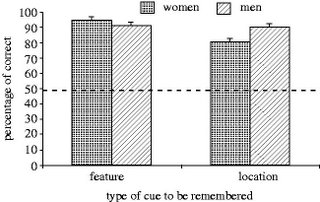|
Tuesday, May 30, 2006
More obviously non-controversial research on cognition and sex differences, Differences in cue use and spatial memory in men and women:
Science is like a box of chocolates, you don't get to know the details until you start rooting through it. Major tables with p values below the fold.  "Although the men tested tended to be older than the women (one-way ANOVA: F1,45=2.94, p=0.09) and the two experimenters tested subjects of significantly different ages (F1,45=9.24, p=0.004; experimenter A's subjects: mean, 22.44 years; range, 21-24; experimenter B's subjects: mean, 21.41 years; range, 20-24), age was not correlated with performance on either task (controlling for sex and experimenter; feature: F1,43=1.36, p=0.25; location: F1,43=0.45, p=0.50). Therefore, the observed differences in performance between the men and women on the location task is unlikely to have been due to differences in their ages."  "One-sample t-tests were used to determine whether the number of times that the men and women chose the new location on the probe trials differed from random (i.e. a score of three). The choices of the men did not differ from random (n=20, t=0.42, p=0.68), but those of the women did (n=20, t=-3.33, p=0.004). Women chose the new location significantly less often than would be expected if they were making choices at random." |



